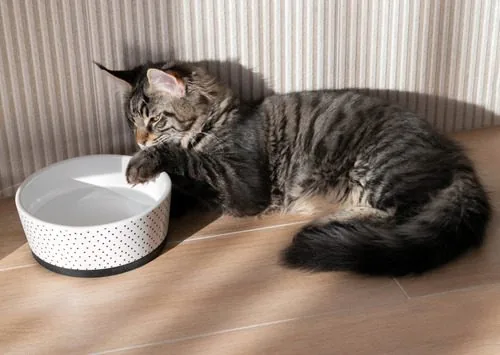Why Won’t My Cat Drink Water?
Cats can be notoriously picky about their hydration, leaving many pet owners wondering, Why won’t my cat drink water? Unlike dogs, who tend to lap up water eagerly, cats have a low thirst drive, which stems from their desert-dwelling ancestors. However, proper hydration is essential for your cat’s overall health, and a lack of water intake can lead to serious issues like kidney disease and urinary tract infections. If your cat seems uninterested in their water bowl, there may be underlying reasons affecting their drinking habits.
At Bottletree Animal Hospital in Oxford, MS, we understand how concerning it can be when your cat refuses to drink. In this article, we’ll explore the possible reasons behind your cat’s reluctance to hydrate, signs of dehydration to watch for, and how you can encourage them to drink more water. If you’re worried about your cat’s hydration, give us a call at (662) 234-4336 today.

How Much Water Should a Cat Drink Daily?
Before worrying about whether your cat is drinking enough water, it’s important to understand how much they actually need. On average, cats require 3.5 to 4.5 ounces of water per five pounds of body weight each day. This means that a 10-pound cat should consume roughly 7 to 9 ounces of water daily. However, a cat’s total hydration doesn’t just come from their water bowl—moisture content in their food also plays a role.
Wet Food vs. Dry Food Hydration
Wet food contains about 70-80% water, contributing significantly to a cat’s daily hydration needs. Dry kibble, on the other hand, contains only about 10% water, meaning cats who primarily eat dry food need to drink more from their water bowl. If your cat eats mainly dry food and isn’t drinking enough water, dehydration can quickly become a concern.
Potential Reasons Why Your Cat Won’t Drink Water
If you find yourself asking, why won’t my cat drink water? there are several possible explanations. Some are behavioral, while others may indicate an underlying medical issue.
Cats Prefer Fresh, Running Water
Cats are naturally drawn to moving water, as it is often fresher and less likely to contain bacteria in the wild. If your cat refuses to drink from a stagnant water bowl, they may prefer running water instead. Many cat owners find that investing in a cat water fountain helps encourage their cat to drink more.
The Water Bowl Location Matters
The placement of your cat’s water bowl can affect their willingness to drink. Cats prefer their water to be in a separate location from their food and litter box. If their water is too close to their food dish, they may instinctively avoid it due to an aversion to contamination. Try placing multiple water bowls throughout your home to see where your cat prefers to drink.
Sensitivity to Bowl Material and Size
Believe it or not, the type of water bowl you use can influence your cat’s drinking habits. Some cats dislike plastic bowls because they can retain odors and bacteria. Instead, opt for ceramic, stainless steel, or glass bowls. Additionally, cats have sensitive whiskers, so they may prefer wide, shallow bowls that don’t touch their whiskers when they drink.
Health Issues Can Impact Thirst Levels
If your cat is suddenly drinking less water, it could be a sign of an underlying health condition. Some common medical issues that affect hydration include:
Dehydration and Kidney Disease
Cats with kidney disease often drink more water, but dehydration can still be a major concern. If your cat is dehydrated, they may be lethargic, have dry gums, or lose skin elasticity.
Urinary Tract Infections (UTIs) and Bladder Stones
If your cat is drinking less water, they may be at a higher risk for UTIs and bladder stones. These conditions can cause discomfort and lead to serious complications if untreated. If you suspect a medical issue, it’s best to schedule an appointment with Bottletree Animal Hospital at (662) 234-4336.
Signs That Your Cat is Dehydrated
If your cat won’t drink water, dehydration can set in quickly. Here are some warning signs to watch for:
- Lethargy or decreased energy levels
- Dry gums or sticky saliva
- Loss of skin elasticity (tenting skin test)
- Sunken eyes
- Loss of appetite
To check for dehydration, gently pinch the skin between your cat’s shoulder blades. If it doesn’t snap back quickly, your cat may be dehydrated. If you notice any of these signs, call us at (662) 234-4336 for an evaluation.
How to Encourage Your Cat to Drink More Water
If you’re struggling to get your cat to drink enough water, try these strategies to make hydration more appealing.
- Switch to Wet Food or Add Water to Their Meals: Since wet food has a high moisture content, incorporating it into your cat’s diet can help keep them hydrated. You can also mix a little water into their food to further boost hydration.
- Try a Cat Water Fountain: As mentioned earlier, many cats prefer moving water over still water. A cat fountain mimics natural running water, which can make drinking more enticing.
- Offer Multiple Water Sources: Some cats are picky about their water location. Place several water bowls around your home to give them easy access.
- Flavor the Water with Broth: If your cat is reluctant to drink plain water, try adding a splash of low-sodium chicken broth or tuna water (packed in water, not oil) to encourage them.
- Keep the Water Fresh and Clean: Cats dislike stale or dirty water. Change their water daily and wash their bowl with soap and water to prevent bacterial buildup.
When to Contact Your Veterinarian at Bottletree Animal Hospital
If you’ve tried multiple strategies and your cat still refuses to drink water, it’s time to consult your veterinarian. Chronic dehydration can lead to serious health problems like kidney disease, urinary blockages, and electrolyte imbalances. At Bottletree Animal Hospital, we can help determine the underlying cause of your cat’s reluctance to drink and provide the best solution for their health. If you’re concerned about your cat’s hydration, call us at (662) 234-4336 today.
Recent Posts
About Us
Welcome to Bottletree Animal Hospital, your family-friendly veterinarian in Oxford. We are a team of animal lovers who are passionate about veterinary excellence. We love working closely with you and your pet to help us learn more about your furry friend, their lifestyle, and their needs.

